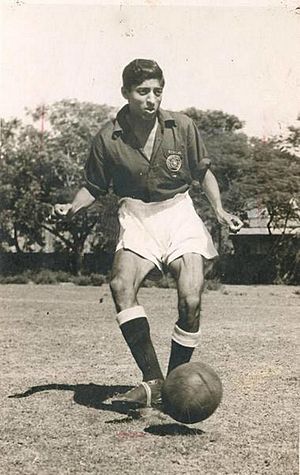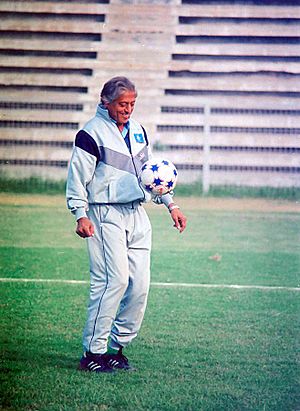Chuni Goswami facts for kids

Goswami with India in 1959
|
||||||||||||||||||||||
| Personal information | ||||||||||||||||||||||
|---|---|---|---|---|---|---|---|---|---|---|---|---|---|---|---|---|---|---|---|---|---|---|
| Birth name | Subimal Goswami | |||||||||||||||||||||
| Date of birth | 15 January 1938 | |||||||||||||||||||||
| Place of birth | Kishoreganj, Bengal Presidency, British India (present-day Dhaka Division, Bangladesh) |
|||||||||||||||||||||
| Date of death | 30 April 2020 (aged 82) | |||||||||||||||||||||
| Place of death | Kolkata, West Bengal, India | |||||||||||||||||||||
| Position(s) | Striker | |||||||||||||||||||||
| Youth career | ||||||||||||||||||||||
| 1946–1954 | Mohun Bagan | |||||||||||||||||||||
| Senior career* | ||||||||||||||||||||||
| Years | Team | Apps | (Gls) | |||||||||||||||||||
| 1954–1968 | Mohun Bagan | 200+ | (200) | |||||||||||||||||||
| International career‡ | ||||||||||||||||||||||
| 1956–1964 | India | 30 | (9) | |||||||||||||||||||
| Managerial career | ||||||||||||||||||||||
| 1986–1989 | Tata Football Academy (director) | |||||||||||||||||||||
| 1991–1992 | India | |||||||||||||||||||||
|
Medal record
|
||||||||||||||||||||||
| *Club domestic league appearances and goals, correct as of 27 May 2008 ‡ National team caps and goals, correct as of 27 May 2008 |
||||||||||||||||||||||
Subimal "Chuni" Goswami (born 15 January 1938 – died 30 April 2020) was an amazing Indian athlete. He was a professional footballer (soccer player) and also a top-level cricketer.
As a footballer, he played as a striker or winger. He was the captain of both the famous Mohun Bagan club and the Indian national team. He scored nine goals for India in 30 international games. Chuni Goswami even played for India at the 1960 Summer Olympics. He led the Indian team to win a gold medal at the 1962 Asian Games. His team also came in second place at the 1964 AFC Asian Cup.
Besides football, Goswami was a talented cricketer. He played for the Bengal team in the Ranji Trophy, which is a big cricket tournament in India. He even led his team to the final in 1971–72. In 2020, India honored him with a special postage stamp. He also wrote a book about his life called Khelte Khelte (Playing and Playing).
Contents
About His Life
Chuni Goswami was born in Kishoreganj, which was part of British India back then. When he was a child, his family moved to Calcutta (now Kolkata) and settled there. His older brother, Manik Goswami, was also a footballer. Chuni Goswami was married to Basanti, and they had a son named Sudipto.
Football Journey
Chuni Goswami is special because he played for only one club, Mohun Bagan, his entire career. Many other clubs, even famous ones like Tottenham Hotspur from England, wanted him to play for them, but he always stayed loyal to Mohun Bagan.
Playing for Clubs
Goswami joined the junior team of Mohun Bagan in 1946 when he was just 8 years old. He played for their junior teams until 1954. Then, he joined the senior team. His first game for the senior team was on 29 May 1954, where he even scored a goal!
He continued to play for Mohun Bagan until he stopped playing football in 1968. In the 1960s, he and another player, Jarnail Singh, were the highest-paid players at the club. Chuni Goswami was the captain of Mohun Bagan for five seasons, from 1960 to 1964. During his time there, his team won many important trophies. They won the Calcutta Football League six times, the IFA Shield four times, and the Durand Cup four times.
Playing for India
Chuni Goswami played his first international game for India in 1956. India won that game 1–0 against the Chinese Olympic team. He played in 50 international matches for India in total. These included games in the Olympics, Asian Games, Asia Cup, and Merdeka Cup.
He was the captain when India won the Gold Medal at the Asian Games in 1962. He also led the team to a Silver Medal at the 1964 AFC Asian Cup and in the Merdeka Cup. Goswami was known for playing incredibly well with his teammates P. K. Banerjee and Tulsidas Balaram. People often call them the "Indian football's holy trinity" because they were so good together.
He played in 30 official international matches for the Indian national team and scored 9 goals.
Achievements and Awards
Chuni Goswami won many awards during his career and even after he retired. These awards recognized his great contributions to Indian football.
Mohun Bagan
- Durand Cup: 1959, 1960, 1963, 1964, 1965
- IFA Shield: 1960, 1961, 1962, 1967
- Rovers Cup: 1966
- Calcutta Football League: 1959, 1960, 1962, 1963, 1964, 1965
India
- Asian Games Gold medal: 1962
- AFC Asian Cup runners-up: 1964
- Merdeka Tournament runner-up: 1964
Bengal
- Santosh Trophy: 1955–56, 1958–59
Individual Awards
- 1958 – Best Footballer Award by Kolkata Veterans Sports Club
- 1962 – Best Striker of Asia Award
- 1963 – Arjuna award (a top sports award in India)
- 1983 –
 Padma Shri award (a high civilian award in India)
Padma Shri award (a high civilian award in India) - 2001 – Mohun Bagan Ratna Award (the highest honor from his club)
Records
- He is the top goal scorer in the Calcutta Football League with 145 goals.
Cricket Journey
| Cricket information | |||||||||||||||||||||||||||
|---|---|---|---|---|---|---|---|---|---|---|---|---|---|---|---|---|---|---|---|---|---|---|---|---|---|---|---|
| Batting | Right-handed | ||||||||||||||||||||||||||
| Bowling | Right arm fast medium | ||||||||||||||||||||||||||
| Role | All-rounder | ||||||||||||||||||||||||||
| Domestic team information | |||||||||||||||||||||||||||
| Years | Team | ||||||||||||||||||||||||||
| 1962–1973 | Bengal | ||||||||||||||||||||||||||
| Career statistics | |||||||||||||||||||||||||||
|
|||||||||||||||||||||||||||
|
Source: Cricinfo, 7 March 2014
|
|||||||||||||||||||||||||||
Chuni Goswami also played cricket at a very high level. He started playing for the Bengal team in the Ranji Trophy in 1962–63. He was a right-handed batsman and a right-arm medium-fast bowler.
After he stopped playing football, Goswami focused completely on cricket for West Bengal. He played in two Ranji Trophy finals, but his team lost both times to Mumbai. In one final in 1968–69, he scored 96 and 84 runs, which are great scores! He also led the Bengal cricket team to the 1972 Ranji Trophy final.
In December 1966, he played against the West Indies team, which was touring India. He took 8 wickets in that match, helping his team win surprisingly. In his cricket career, which lasted until 1972–73, he played 46 first-class matches. He scored 1,592 runs, including one century (100 runs) and seven half-centuries (50 runs). He also took 47 wickets.
After Playing Career
After retiring from playing, Goswami became a team official for Mohun Bagan. He later became the director of the Tata Football Academy in 1986. He also managed the India national football team from 1991 to 1992.
His Passing
Chuni Goswami passed away on 30 April 2020, in Kolkata. He was 82 years old. He had been unwell for some time with different health issues. His family shared that he was taken to a hospital and died after a heart attack.
See also
 In Spanish: Chuni Goswami para niños
In Spanish: Chuni Goswami para niños
 | Audre Lorde |
 | John Berry Meachum |
 | Ferdinand Lee Barnett |


